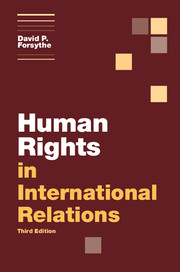Book contents
- Frontmatter
- Contents
- Preface to the third edition
- Preface to the second edition
- Preface to the first edition
- Part I The foundations
- 1 Introduction: human rights in international relations
- 2 Establishing human rights standards
- Part II Implementing human rights standards
- Part III Conclusion
- Index
- References
1 - Introduction: human rights in international relations
from Part I - The foundations
- Frontmatter
- Contents
- Preface to the third edition
- Preface to the second edition
- Preface to the first edition
- Part I The foundations
- 1 Introduction: human rights in international relations
- 2 Establishing human rights standards
- Part II Implementing human rights standards
- Part III Conclusion
- Index
- References
Summary
Human rights are widely considered to be those fundamental moral rights of the person that are necessary for a life with human dignity. Human rights are thus means to a greater social end, and it is the legal system that tells us at any given point in time which rights are considered most fundamental in society. Even if human rights are thought to be inalienable, a moral attribute of persons that public authorities should not contravene, rights still have to be identified – that is, constructed – by human beings and codified in the legal system. While human rights have a long history in theory and even in spasmodic practice, it was the American and French revolutions of the eighteenth century that sought to create national polities based on broadly shared human rights. Despite the rhetoric of universality, however, human rights remained essentially a national matter, to be accepted or not, until 1945 when they were recognized in global international law.
This book is about the evolution and status of human rights in international relations at the start of the twenty-first century. Thus this extended essay is about the effort to liberalize international relations – to make international relations conform to the liberal prescription for the good society. In the classical liberal view, the good society is based on respect for the equality and autonomy of individuals, which is assured through the recognition and application of the fundamental legal rights of the person. In this book liberalism is a synonym for attention to personal rights. But in international relations it has been widely believed that the state, not the individual, is the basic unit. And the core principle has been said to be state sovereignty and non-interference in the domestic affairs of states. In this book realism is a synonym for attention to state interests – foremost among which is security – and state power. The subject of international human rights thus projects liberalism into a realist world – a world dominated for several centuries by states and their collective interests.
- Type
- Chapter
- Information
- Human Rights in International Relations , pp. 3 - 36Publisher: Cambridge University PressPrint publication year: 2012
References
- 1
- Cited by

